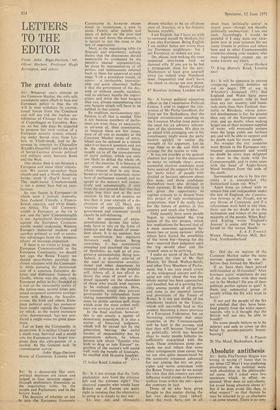Sir: A former political education officer in the Conservative Political
Centre, I wish to support the con- tention of Mr Philip Goodhart, the Tory MP for Beckenham, that the unique circumstances attaching to the Common Market issue point to the need for an advisory referen- dum of the electorate. His plan to go ahead with arranging one in his constituency might assist the party leaders quickly to realise the strength of his argument. Let us urge them so to do, and then to arrange for the nation to vote.
It was not possible at the general election last year for the electorate to make its attitude clear: every successful election candidate must have received the support for his or her 'party ticket' of people with divided or hesitant opinions about this issue, and those candidates themselves were also divided in their opinions. If the electorate is not given the opportunity to register consent to or dissent from this project of such revolutionary proportions, then I do really fear for the future of politics in this country and much else besides.
Only recently have some people begun to understand the true
nature of the EEC project, which
has implications far beyond that of a mere economic agreement be- tween two or more nations: while others have feared the possibility of the worst but—hoping for the best—reserved their judgment until the fog should clear and the 'crunch' seem to be arriving.
I make no secret of the fact that I support the view of Mr Neil Marten, Sir Derek Walker-Smith, and other Tory Members of Parlia- ment, but I am very much aware of the widespread anxiety and dis- quiet not only about the way the whole matter has been approached and handled, but of a growing hos- tility among people of all parties and none to the essential nature and provisions of the Treaty of Rome. It is not just dislike of the conditions implicit in the Treaty, which will inevitably lead to this country becoming a mere province of a European Federation, but an increasing awareness that other countries in the Commonwealth will be hurt in the process, and that they will become 'foreign' to us politically, which has become clear to many people hitherto in- sufficiently acquainted with the facts. These conditions alone per- suade me and others that some other arrangement must ensue; but we are also quite unconvinced by the economic argument advanced for our joining the arc on prin- ciples and terms consistent with the Rome Treaty; nor do we accept the view that this country can only influence world events or European welfare from within the EEC—q ui le the contrary, in fact.
Those of us who have given thought to this matter during the last two decades (and. indeed, since the war). have not in all cases been 'politically active' in recent years—though not thereby politically unobservant: I am one such. Accordingly I would be grateful if I may state my view- point now in your columns for my many friends in polities and others here and in other Commonwealth countries among your readers, who may legitimately expect me to make known my views.
Oliver Herbert 75 King Henry's Road, London NW 3


































 Previous page
Previous page